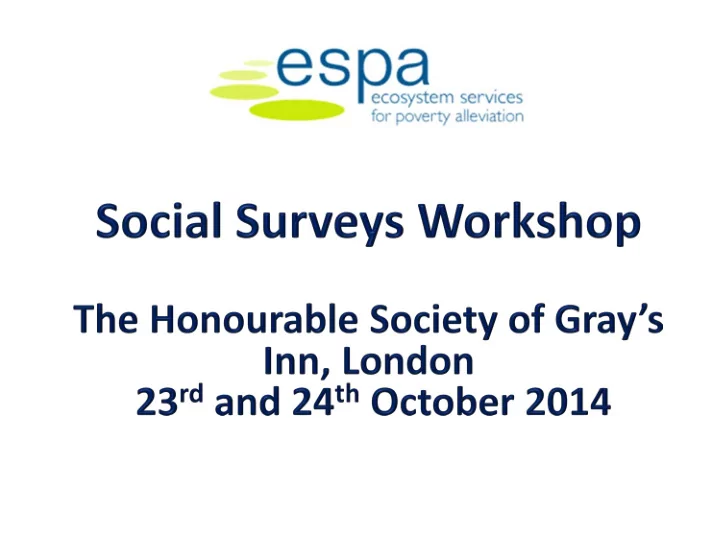

1
Why are we here? • Many ESPA projects use social surveys (broadly defined) and face similar challenges • Specific focus on what is different about implementing social surveys in the ES context • Learning from each other – best practice 2
Key workshop themes 1. What are the implications of an ecosystem services framework for the conceptual design of socioeconomic surveys? 2. What are the practical implications for HH surveys undertaken in an ES context? 3. The challenges of data-integration. 4. What opportunities are there for synthesis of household survey results across ESPA projects? Which are the key areas in which new findings are apparent or expected? 5. How best should data from social surveys be archived, taking into account the need to maintain confidentiality of informants and maximise the opportunities for use by future researchers? 3
Expected outputs 1. Internal workshop report highlighting areas for future cross-project syntheses or additional collaborative data analyses. 2. ESPA Working Paper on the opportunities and constraints of undertaking social surveys in ESPA-type research. 3. ESPA Working Paper on Data Archiving for Social Survey data collected in multidisciplinary projects. 4
Session 1: Implications of an ES framework for the conceptual design of social surveys • Neal Hockley: What has the ES framework ever done for us? Do ecosystem service concepts assist or bias poverty-focussed research? • Carlos Torres Vitolas: Defining well-being: expenditure, income, nutrition, capital… where do ES fit in? • Claudia Ringler (for Wei Zhang): Challenges and opportunities of undertaking social surveys in the context of interdisciplinary projects on ecosystem services. • Janet Fisher/Casey Ryan: Looking at poverty through an ecosystem services lens: remembering to cover blind spots as well as objects in sharp relief 5
Theme 1 discussion questions: What are the implications of an ecosystem services framework for the conceptual design of socioeconomic surveys? • How does an ES-framework inform current mainstream understandings of poverty and well-being? • Are current standard survey frameworks for measuring poverty and well-being adequate for ES social research? • How do differences in the epistemological assumptions of natural sciences as compared with those in the social sciences affect the design of socioeconomic surveys for ES research? • What types of ES-related poverty and well-being indicators are being produced through social surveys? 6
Session 2: Practical implications for HH surveys in an ES context • Carla Romeu-Dalmau: Getting sampling strategies and units of analyses right, and the use of focus groups as a supplementary method to HH surveys. • Rina Mandimbiniaina Rabemorasata: Sampling and ethical challenges of undertaking social surveys in an ESPA context • Tewodros Tefera Ameda: Participatory wealth ranking and poverty dynamics and its link with ecosystem services • Charlie Langan: Use of smartphone technologies in HH surveys 7
Theme 2 discussion questions: Practical implications for HH surveys in an ES context • Sampling strategies: Spatial issues, temporal issues and replication – what compromises are necessary to sample at scales relevant to both natural and social scientists? • Units of analysis: Challenges to identify the beneficiaries of ES – communities, socioeconomic groups, households or individuals . • Ethical issues: To what extent do ES-oriented socioeconomic household surveys generate new challenges in researcher-researched interactions (sensitivity of questions, confidentiality issues, compensation for time, etc.)? • Use of existing household surveys in ES-related research: To what extent does ES-research require new (or supplementary) approaches to household survey design? 8
Theme 4: Thinking about possible syntheses across projects What ideas do you have for using data from multiple projects to derive insights on: • Specific geographic areas • Particular ecosystems or ecosystem services • Particular user groups and wellbeing measures • Data collection/analysis methods Post ideas on flipcharts – can be anonymous or named 9
Session 3: Challenges of data integration • Helen Adams: Sampling based on socio- ecological systems to support data integration • Andrew Bell: Integrating social surveys, behaviour experiments and ecological field experiments through ABM • Kate Schreckenberg: Integrating across disciplines and scales • Sarobidy Rakotonarivo: Using in-depth interviews to supplement quantitative surveys 10
Theme 3 discussion questions: Challenges of data integration • Which ES-informed well-being and poverty dimensions cannot be adequately measured with social surveys? • What kind of mixed-method approaches are suitable for filling in the gaps? How do they complement socioeconomic survey data? • How can socioeconomic survey data be integrated with bio-physical data (other than through use of modelling techniques)? 11
Session 4: Data archiving • Simon Willcock: The challenges of using other people’s data • Mahesh Poudyal: Confidentiality issues – the need for data firewalls both within projects and for external users • Veerle Van den Eynden and Celia Russell: – Data repositories – Best practice for data sharing 12
Recommend
More recommend